Horseradish & Herb Beef Jerky is a bold blend of salt, pepper, and herbs with just a hint of horseradish. Delicious, flavorful, and easy to make!
Making your own homemade beef jerky in a dehydrator is easy and satisfying. Made without any added preservatives, the jerky tastes better than store bought, is better for you, and the potential flavor combinations are endless.
Horseradish & Herb Beef Jerky has a subtle horseradish flavor and a peppery bite. The blended onions and garlic in the marinade infuse a deep sweet onion flavor while the herbs are the first thing you taste. A great flavor combination all around!
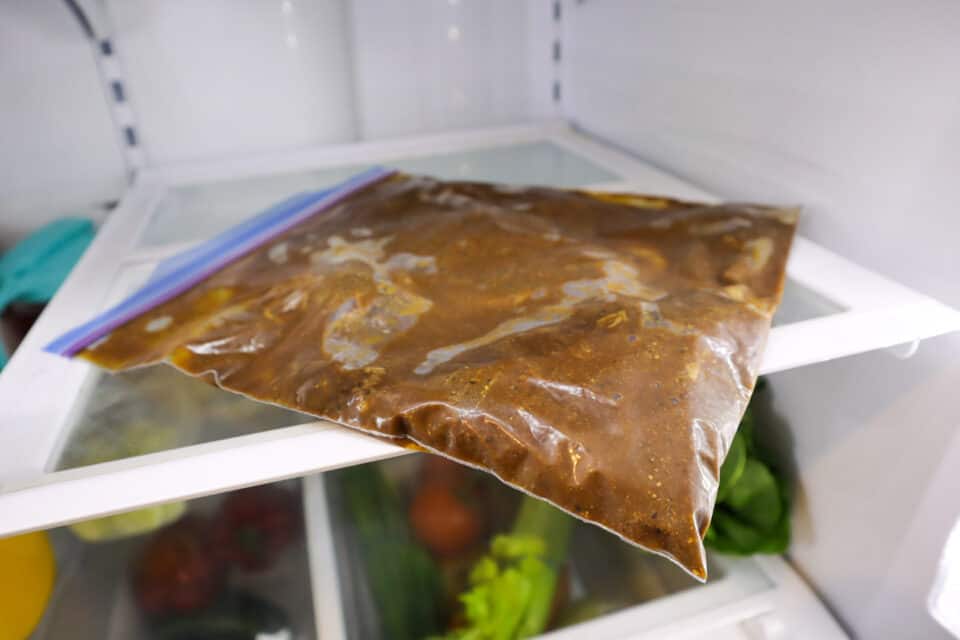
The Secret to Making Flavorful Beef Jerky
The thing with beef jerky is that the jerky strips require both a flavorful marinade and enough time to soak in all of those flavors.
When we started making our own homemade beef jerky, we were so excited to make it that we didn’t leave it in the marinade for long enough. After a 6 hour marinating time, and even after a 12 hour marinating time, our jerky just wasn’t very flavorful.
Now when we make jerky, we allow the jerky strips to marinate in the refrigerator for an absolute minimum of 24 hours, sometimes up to a week! Typically, around the 48-72 hour mark the flavors are fully infused and the jerky will be delicious.
As you experiment, you find the flavor level that’s right for you. The longer the marinade time, the deeper the flavors of the jerky and the better it is!
The UDSA has a great page with all sorts of facts about Beef Jerky that you can get to by clicking here. Great resource!
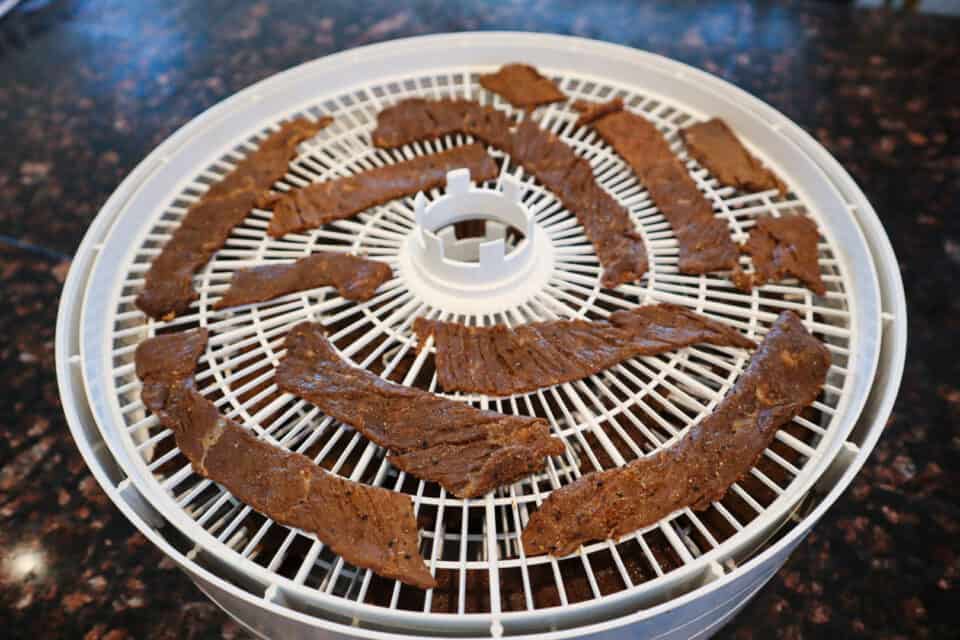
TOP TEN TIPS FOR MAKING The Best Beef Jerky
- London Broil (Top Round) is the best meat to use for homemade beef jerky. Strips need to be cut between 1/8 and 1/4 inch thick. NO THICKER THAN THAT.
- How you cut the meat determines the final result. Try to cut the jerky strips evenly, thinly, and against the grain.
- Marinate, marinate, marinate. The beef jerky flavor combination that you choose and how long you allow the beef jerky strips to marinate really determine the final result. Marinating under 12 hours will most likely not give you the best flavor. You have to let the jerky strips absorb the flavors and this can’t be rushed. Try to move the meat around while the marinating and turn the bag. A zip top bag is a great tool to use when marinating as it is pliable and the meat can be moved around without opening the bag.
- Be careful with salt. Salt seems to be the first thing to be absorbed and it can’t be removed. Too salty = bad. Use garlic POWDER and onion POWDER, not the salt versions.
- Taste and smell your marinade. If the marinade is flavorful before adding the meat, the jerky will turn out great.
- Marinate your beef jerky in the refrigerator. No one wants food poisoning!
- A food dehydrator is a good investment. You can make beef jerky in the oven but it is harder to get a great end product and the process takes much longer.
- If a recipe says that making beef jerky in the dehydrator will take 5 hours, start checking it at an hour and a half. Timing depends on temperature, thickness and moisture, not what a cookbook says.
- Don’t be afraid to move the beef jerky strips and the trays around. Also, don’t be afraid to remove the thinner pieces that are done before the thicker ones. No one is perfect when cutting meat into strips. Check often!
- And finally, don’t ever put marinated beef jerky into the dehydrator and go to bed, thinking it will be done in the morning. If you do this, you could end up with over dried jerky that will most likely be inedible. After all that marinating time, it is really sad to have to throw it out!
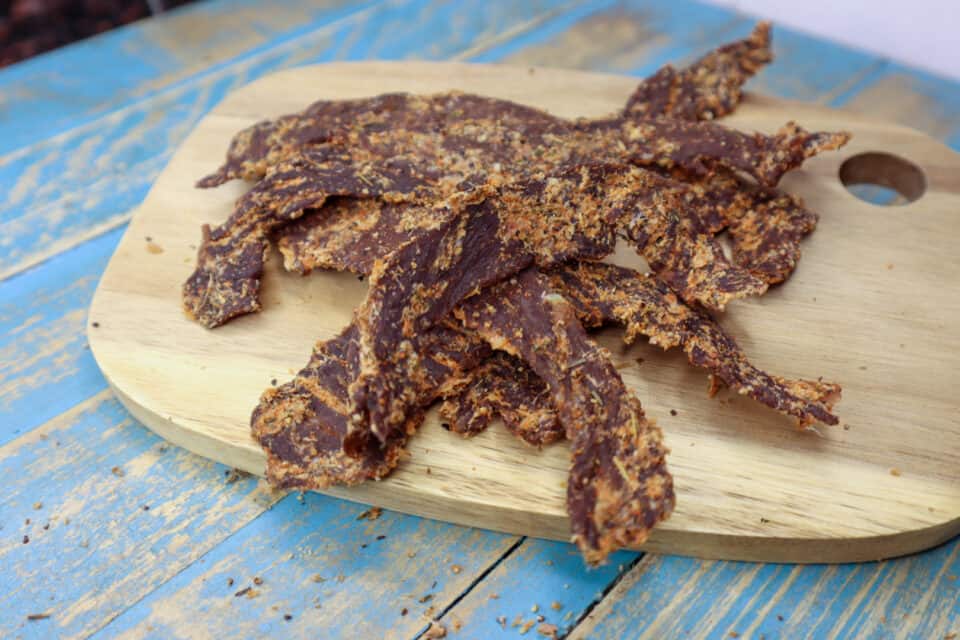
What if I don’t have a Dehydrator?
A lot of people ask how to make beef jerky without a dehydrator and if it’s possible to make beef jerky in an oven. Of course it is!
Prepare and marinate the beef jerky exactly as you would if you were using a dehydrator but instead, line two large baking sheets with foil and then place a wire cooling rack onto each. This allows the meat to have some air flow.
Preheat the oven to the lowest temperature it will preheat to. Usually this is 170 – 175 degrees F. Position the oven racks to the upper-middle position.
Lay the marinated beef strips out onto the wire racks and bake until the meat is dryer and considerably less spongy than it was going in. Much like a dehydrator, it is important to pay attention to the meat by moving the jerky around and rotating the trays.
Feeling the jerky with your fingers is the best gauge of done-ness. Cooking times vary upon the thickness of the meat and this process can take anywhere from 2-12 hours. Enjoy!
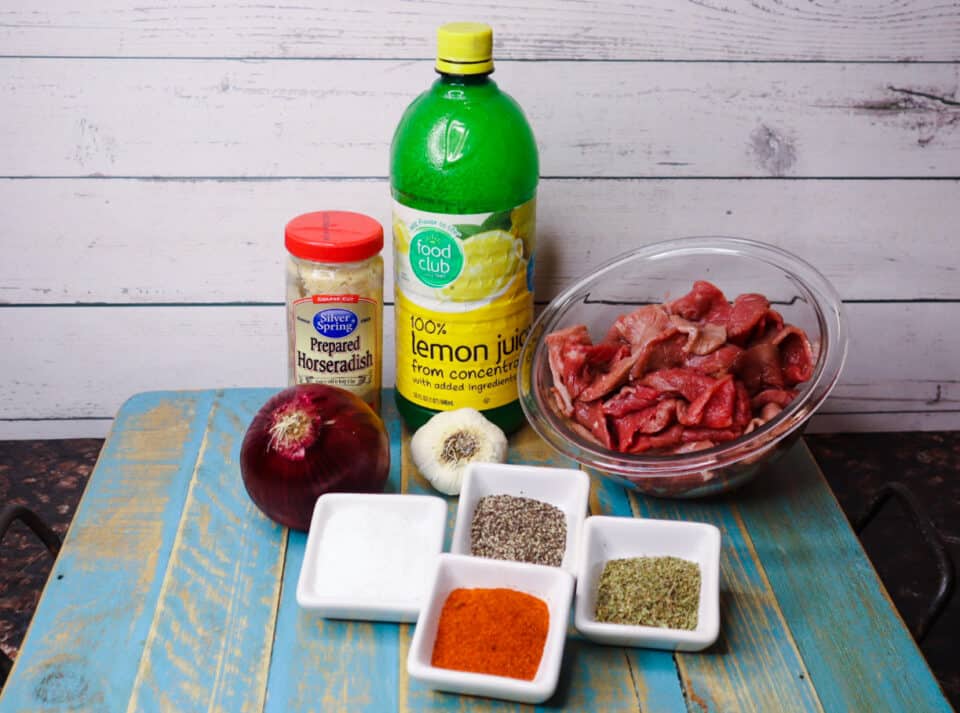
What you’ll need to make Horseradish & Herb Beef Jerky
- London Broil – sliced into strips between 1/8 and 1/4 inch thick against the grain, any large fatty parts removed. Top round roast or eye of round may be substituted.
- Onions – We use one small yellow onion and one small purple (or red) onion, about 1/2 cup each. White onions, sweet onions, red onions, or even shallots may be used instead.
- Fresh Garlic – One bulb – this is usually 10 – 12 cloves. You can substitute 2 tablespoons of garlic paste, minced garlic, chopped garlic, or in a pinch, use 2 teaspoons of garlic powder.
- Lemon Juice – We use 1/4 cup of bottled lemon juice or the juice of one large lemon.
- Prepared Horseradish – 1/3 cup of prepared horseradish, or if you are feeling extra ambitious, 1/4 cup of fresh grated.
- Pantry Spices – Kosher salt, ground black pepper, paprika, and dried thyme.

Preparing the Meat for Beef Jerky
Beef Jerky begins with a lean cut of meat, cut into long, thin strips against the grain.
We use London Broil, which is a fancy name for a smaller beef top round roast (eye of round). The meat should be lean and not contain bones.
We use between 1 – 2 pounds at a time, sliced into strips between 1/8 and 1/4 inch thick, with any large fatty parts removed.
You can cut it yourself or ask the supermarket butcher to do it for you. Cut against the grain to make the jerky more tender. Once cut, set it aside until the marinade is ready.

How to Make Horseradish & Herb Beef Jerky
Horseradish & Herb Beef Jerky has a deep sweet onion flavor with hints of fresh herbs and garlic. a subtle horseradish flavor and a peppery bite. A great flavor combination that really enhances the beef taste of the jerky.
Guidelines for using an oven are included below, just in case you don’t have a dehydrator and want to give this recipe a try.
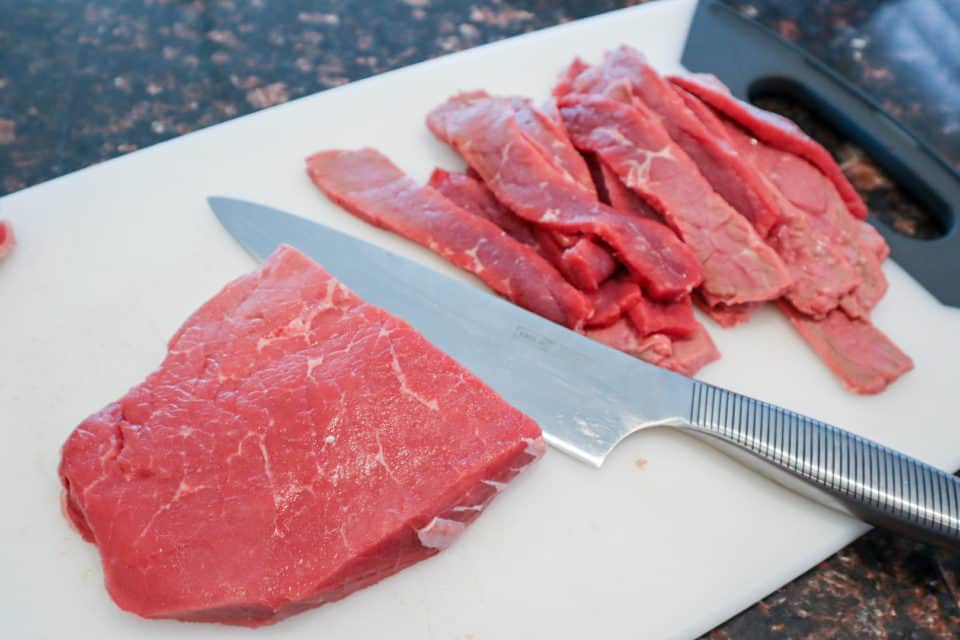
Prepare jerky strips by slicing the beef into strips that are no more than 1/4 inch thick, against the grain, and removing any large fat. Set aside.
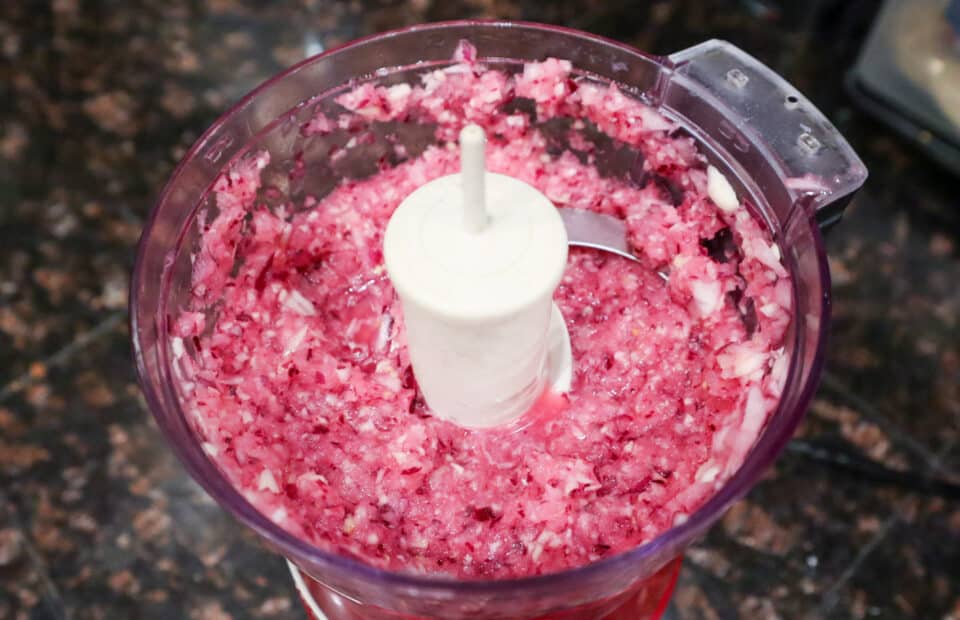
Place onion chunks, garlic and lemon juice into a small food processor and pulse until mostly smooth.
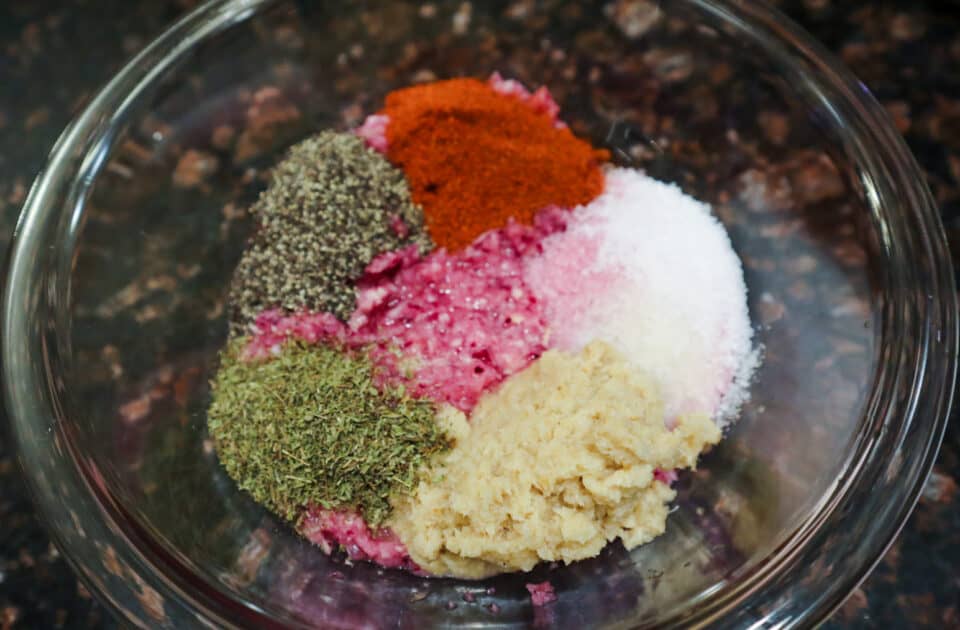
Pour into a medium bowl and add horseradish, kosher salt, pepper, paprika and dried thyme. Stir to combine.
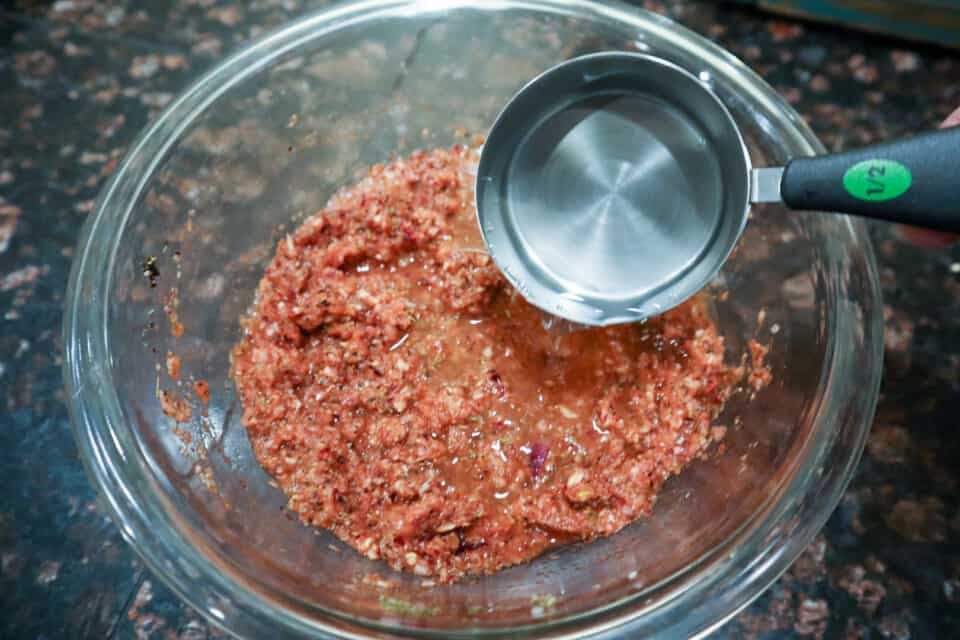
Stir in water until completely incorporated.

Place jerky strips into a large bowl or zip top bag and pour marinade over the top. Stir or push the strips around until evenly coated.
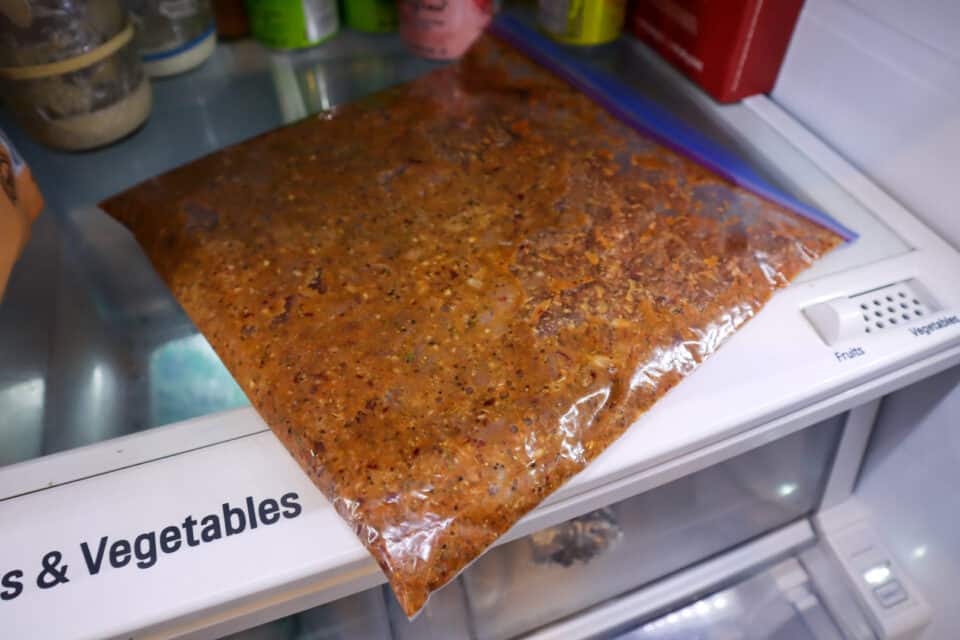
Place the meat into the refrigerator and marinate for at least 12 hours, flipping the bag or stirring occasionally.

Remove the meat from the marinade and lay the strips out onto a double layer of paper towels. Use additional paper towels to blot off excess marinade from the tops of the strips.

Lay the marinated jerky strips out out on dehydrator trays, leaving space between for air flow. Use as many trays as necessary.
Choose the highest temperature setting on the dehydrator (typically 160 degrees). Begin checking the jerky strips after 60-90 minutes. Flip the jerky strips and rotate trays during the dehydration process. The jerky will become less spongy but remain pliable and it will develop a dry, leathery appearance.

Once sufficiently dried, remove to a resealable container or large zip top bag and allow to cool before sealing.
Store in an airtight container in a cool place (or refrigerator) for up to a month. Enjoy!
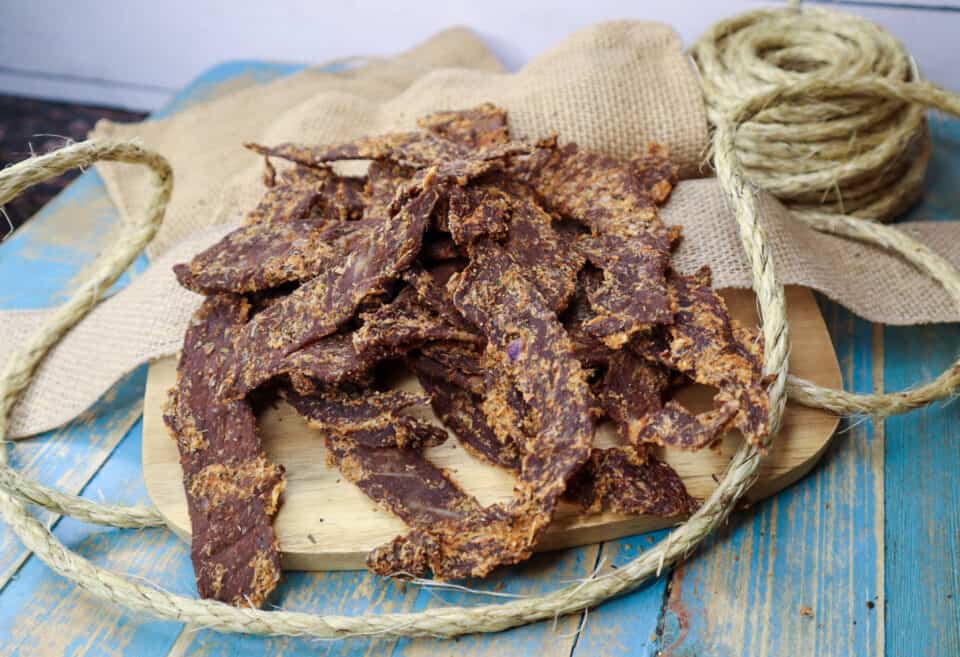
All of our Favorite Beef Jerky Recipes
Spicy Dr. Pepper Beef Jerky – delicious and sweet with a low, subtle heat and a bold beefy flavor.
Teriyaki Sweet Hot Beef Jerky – Jerky with a sweet Teriyaki flavor and just the right amount of heat.
The Best Bloody Mary Beef Jerky – Unusual and unforgettable with hints of celery, tomato and the perfect amount of heat!
Worcestershire Beef Jerky – A tried and true family favorite and one of our most requested flavor combinations!
Sweet & Spicy Beef Jerky – A fan favorite! Deliciously balanced between sweet & Spicy!
Black Pepper Beef Jerky – This easy to make homemade Black Pepper Beef Jerky is delicious with a low, subtle heat.
Korean BBQ Beef Jerky – A little spicy, salty and sweet, Gochujang paste brings deep and savory flavor!
Pineapple Jalapeno Beef Jerky – An awesome balance of sweet & spicy. Delicious with a mild background heat.

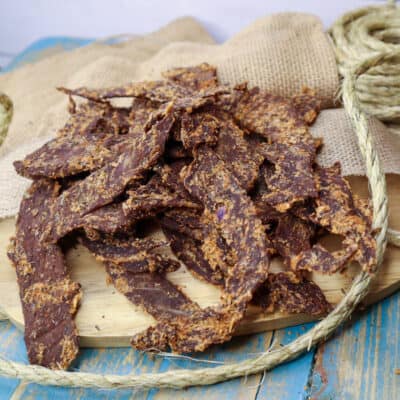
Horseradish & Herb Beef Jerky
Equipment
- Electric Food Dehydrator
Ingredients
- 1-2 pounds London Broil or top round roast, cut into thin strips
- 1 small yellow onion cut into chunks
- 1 small purple onion cut into chunks
- 1 bulb fresh garlic 10 – 12 cloves, peeled
- 1/4 cup lemon juice
- 1/3 cup prepared horseradish
- 1 tbsp kosher salt
- 1 tbsp ground black pepper
- 1 tbsp paprika
- 1 tbsp dried thyme
- 1/2 cup water
Instructions
- Prepare jerky strips by slicing the beef into strips that are no more than 1/4 inch thick, against the grain, and removing any large fat. Set aside.
- Place onion chunks, garlic and lemon juice into a small food processor and pulse until mostly smooth.
- Pour into a medium bowl and add horseradish, kosher salt, pepper, paprika and dried thyme. Stir to combine.
- Stir in water until completely incorporated.
- Add the prepared meat strips to a large zip top bag and then pour the marinade over them. Seal the bag, removing most of the air and push the strips around to coat. This will ensure that all of the meat gets evenly flavored.
- Place the zip top bag into the refrigerator. Marinate for at least 24 hours, flipping the bag occasionally and massaging the marinade into the meat.
- Remove the meat from the marinade and lay the jerky strips out onto a double layer of paper towels. Use additional paper towels to blot excess marinade from the tops of the strips.
- Lay the marinated jerky strips out out on dehydrator trays, leaving space between for air flow. Use as many trays as necessary.
- Choose the highest temperature setting on the dehydrator (typically 160 degrees F). Begin checking the progress after 60-90 minutes. Flip the jerky strips and rotate trays during the dehydration process. The jerky will become less spongy but remain pliable, and it will develop a dry, leathery appearance.
- Once sufficiently dried, remove to a resealable container or large zip top bag and allow to cool before sealing.
- Store in an airtight container in a cool place (or refrigerator) for up to a month. Enjoy!
Notes
Nutrition *
* The information shown is an estimate provided by an online nutrition calculator.



Missy Taylor says
This was good but I wish there was more horseradish flavor. Any ideas as to how to make it taste more like it?
Michelle Mundy says
Hi Missy! I used prepared horseradish because it is convenient but if you used fresh horseradish (usually available in bigger grocery stores in the produce department – you may have to ask) the flavor should be much stronger. I haven’t tried it but that should get you the flavor that you are looking for. If you do it, please let me know how it turns out!